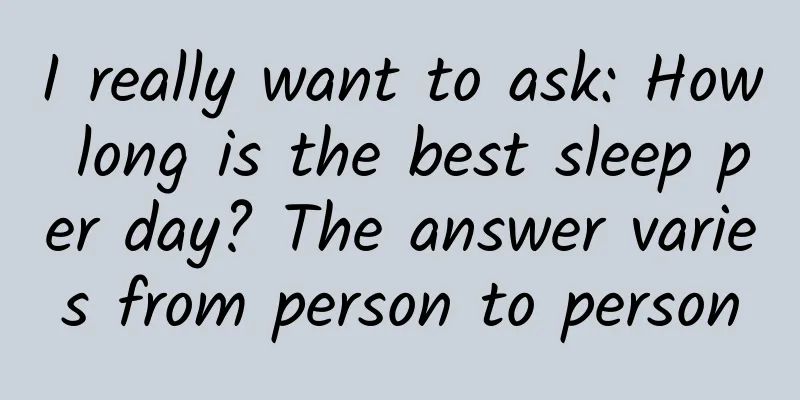I really want to ask: How long is the best sleep per day? The answer varies from person to person

|
"How long is the best sleep for a person?" This question can be said to be the most frequently asked question in the topic of sleep. Many people have heard the saying "it is best for a person to sleep X hours a day" on the Internet or other channels, and then they feel anxious or blame themselves for not meeting this standard, and then fall into a cycle that makes them particularly entangled: the more they want to sleep X hours, the less they sleep. So, how long is the best sleep for a person in a day? Is there an answer to this question? Let me first give the answer: It depends on the person. Image source: pexels Different ages need different sleep hours per day In order to answer the question of "how much sleep do people need", the American Academy of Sleep Medicine once organized a sleep expert group. The group members reviewed hundreds of high-quality studies on sleep time and health issues, and then after several rounds of voting and discussion, they finally set a range for the sleep time required for different age groups. Image source: Author Overall, infants and young children require the most sleep. As they age, the amount of sleep they need tends to decrease, until after the age of 18, when the changes gradually stabilize. Note that it tends to be stable, not fixed. Therefore, sleep needs can vary at different ages. You may have noticed why there are no recommendations for babies under 3 months old. The reason is that the sleep needs of this age group vary greatly [1] (from 11 hours to 19 hours). So, mothers, please be careful not to compete with other children in the community for bedtime and then come back to disturb your baby. Sleep time for adults Does it need to be more than 7 hours a day ? Let me first give the answer: it is still the same, it varies from person to person. But most adults do need more than 7 hours of sleep a day , and the majority here is a statistical "average". If you are usually in a bad state most of the time during the day, often feel sleepy, or need to rely on coffee to stay alive, and then calculate whether you have slept for 7 hours at night, the problem you need to consider at this time is: insufficient sleep at night. The next step is to readjust your work and rest schedule and let yourself sleep more. But please note that neither "most people" nor "average" equals the standard answer. In the sleep time statistics chart, in addition to the 7 hours in the middle, some data are distributed at both ends. The far left is "short sleepers" and the far right is "long sleepers." In this world, there are some people who don't need to sleep that much. Sleeping for 6 or 5 hours is enough. The so-called "enough" means that it does not affect the daytime state. They don't need to take a nap or coffee during the day. They can work just like other ordinary people. Such people are called "short sleepers". Note that short sleepers are not trained, but born short sleepers. Research has found that this is related to certain gene mutations[2]. In terms of numbers, there are very few people with this "gift", no more than 1%, and if estimated, only about 3%[3]. In contrast to short sleepers, some people are born with a need to sleep for a long time . For example, they often need to sleep for 9 or even 10 hours to ensure their energy level during the day (for adults). These people are called “long sleepers” [4]. In many cases, the pattern of long sleepers starts in childhood and continues into adulthood. Image source: pixabay Similar to short sleepers, long sleepers are also rare, accounting for only about 2% of the total population[5]. Moreover, some research suggests that they are also related to genetics. It is obvious that long sleepers are very tired compared to short sleepers . Because no matter in school or at work, the outside world does not allow them to "willfully" sleep as much as they need, so long sleepers are the group of people who are most likely to "not get enough sleep". They often doze off during the day, affecting their study and work efficiency. But if it is during holidays, as long as they sleep as much as their body needs, their performance will return to a very good state. In any case, from short sleepers, to the middle "7-9 hours average", to "long sleepers", these sleep data form a normal continuous "time spectrum". The so-called "adults need 8 hours of sleep" is just a reference answer. As an individual, you cannot label yourself as "not enough sleep" or "too much sleep" based on a single number. In other words, the amount of sleep you need can be different from others. Combining what I said before, I can now summarize it in two sentences: Don’t compare your sleep time with the past. Don’t compare your sleep time with others. How to determine how much sleep you need each day? Simply put: see how you behave after waking up. If you can stay awake enough most of the time after waking up, maintain good enough concentration, and it does not affect your work and life, then you can say that you slept well. On the contrary, if you feel sleepy and have decreased concentration after waking up, it means that you are not sleeping well enough - either not enough time, or poor quality, or both. Image source: pixabay At this time, you can refer to the "average" of adults - 7 hours. If the time is less than 7 hours, you can try to find out "where the time has gone". If the time is 7 hours, then you need to find out if there are other "sleep resistances" that are interfering with your sleep quality. If you want to get more specific, you can refer to the “checklist of questions” provided by the National Sleep Foundation [6]: ① Does 7 hours of sleep make you feel productive and healthy? Or do you notice that you need more sleep to function better during the day? ② According to your current work and rest schedule, do you often feel sleepy during your daily work? ③ Do you rely on caffeine to get through the day? ④ Do you tend to sleep more on holidays when you don’t need to work? By answering the above 4 questions, you will have a rough idea of whether your current sleep time is enough. What to do if you don’t get enough sleep? There was an outpatient who, after completing the above "question list", suspected that he might be a "long sleeper". His results were as follows: ① 7 hours of sleep cannot provide a good state during the day. ② Often feel sleepy. ③ Just drink 3 cups of coffee a day. ④ During holidays, I often sleep for 10 hours. At this time, I don’t need to drink coffee during the day and I feel very good. So, for him, it is to sleep as much as possible without delaying work in the morning. How to do it? You can refer to the following 3 steps: 1 Pie in the sky The "pie" here refers to reviewing your "time spending", just like doing household financial expenditures, sorting out the activities before going to bed at night, and calculating how much time each of them takes up. Secondly, sort out the less important projects and try to delete them or reduce their time. Of course, you don’t have to be like an ascetic every night, you can change a little bit each time. 2 ceremony Develop a relaxing bedtime ritual. For example, take a bath, watch your phone, play games, etc., and then stay away from the screen for about half an hour before bedtime. The benefit of doing this is that it can make it easier for the brain to get rid of the intense daytime work and Internet information, which is conducive to falling asleep. 3 Catch up on sleep There are always various things that deprive you and me of sleep at night. If you really don’t get enough sleep at night, you can take a nap to make up for it. However, making up for sleep requires some skills. You can't make up too much at one time, otherwise, it will easily affect your sleep that night and disrupt your overall sleep rhythm. The most recommended way to make up for sleep is to use four words: installment payment. For example, if you don’t get enough sleep on weekday nights, take a 20-minute nap during the noon period. On holidays, sleep a little longer in the morning, no more than 1 hour after waking up on weekdays, and take another 20-minute nap at noon. If you are tired at night, go to bed early. Image source: pexels Summarize: ① Most adults need about 7 hours of sleep, but this is not the standard answer. As an individual, you cannot measure whether you sleep well based solely on this number. ② Whether you get enough sleep depends on your daytime state after waking up. If you don’t get enough sleep, check whether you get 7 hours of sleep as most people do. If not, it indicates that other factors are depriving you of sleep. If you get enough sleep, you need to find out if there are other sleep obstacles that are affecting your sleep quality. ③ If you plan to let yourself sleep more, you can take “3 steps”: make plans, have rituals and make up for the sleep. In short, the adult world is not easy. No one can sleep well every day for 365 days. Don’t worry about short-term lack of sleep. Just treat it as a Buddhist. There are many interesting things worth doing in life, not just for a good night’s sleep. References [1]Kirsch, D. (2022, September 12). Stages and architecture of normal sleep. In SM Harding (Ed.). UpToDate., Retrieved March 1, 2023, from [2]https://www.livescience.com/does-short-sleeper-syndrome-really-exist [3]https://sleepeducation.org/short-sleep-gene-when-six-hours-enough/#:~:text=The%20%E2%80%9Cshort%20sleep%E2%80%9D%20gene%20appears,only%20three%20percent%20of%20people. [4] Patel, SR, Blackwell, T., Ancoli-Israel, S., Stone, KL, & Osteoporotic Fractures in Men-MrOS Research Group (2012). Sleep characteristics of self-reported long sleepers. Sleep, 35(5), 641–648. [5]American Academy of Sleep Medicine. (2014). The International Classification of Sleep Disorders – Third Edition (ICSD-3). Darien, IL. [6]https://www.sleepfoundation.org/how-sleep-works/how-much-sleep-do-we-really-need Planning and production Author: Yu Zhouwei, attending physician of neurology, author of "Sleep Formula" Reviewer: Tang Qin, Director and Researcher of the Science Popularization Department of the Chinese Medical Association Planning丨Lin Lin Editors: Lin Lin, Bai Li |
<<: Can boiling dishes and chopsticks before meals kill bacteria?
Recommend
The national emblem of Saudi Arabia depicts the sweet mystery
On the national emblem of the Kingdom of Saudi Ar...
Free as a fish! All humans need to survive in the ocean is a gill?
Your browser does not support the video tag Autho...
From variable declaration in C language to block syntax in Objective-C
[[164693]] In this article, we start with simple ...
One picture to understand丨How to do the COVID-19 antigen self-test?
Source: People's Daily Client Copywriter: Pei...
In the face of artificial intelligence, what advantages do humans have that will make them irreplaceable?
Audit expert: Xu Runsheng PhD in Artificial Intel...
New Media Operation: How to write a 10w+ title?
I look at the 10w+ titles and don’t know how to a...
World Immunization Day | Salute to “Sugar Pill Grandpa”!
Today is December 15th World Immunization Day Day...
Going to the hospital to clean your teeth is expensive and troublesome. Can you buy an instrument to clean your teeth at home?
Myth: **** “Can you buy equipment to ‘clean your ...
How to measure the effectiveness of advertising?
"Half of my advertising dollars are wasted, ...
Did you know that China's space station "flipped" in space during its construction? Why did they do that?
On September 30, 2022, after about an hour of coo...
China will become the world's largest car owner, with new energy vehicles accounting for more than 40% of the world's total
On December 13, at the New Energy Smart Vehicle E...
How to find accurate drainage methods?
There is a cruel fact: the online traffic dividen...
After floating in the Pacific Ocean for two months, I saw the experimental sample as milk cap.
What do you think of when you mention the Pacific...
Why can iPhone X only store one face at a time? Apple responds
If you want to save all the faces of your loved o...
The detailed schedule of the Google Developer Conference has been confirmed: the new version of Android is coming!
The two most important conferences in the mobile ...









